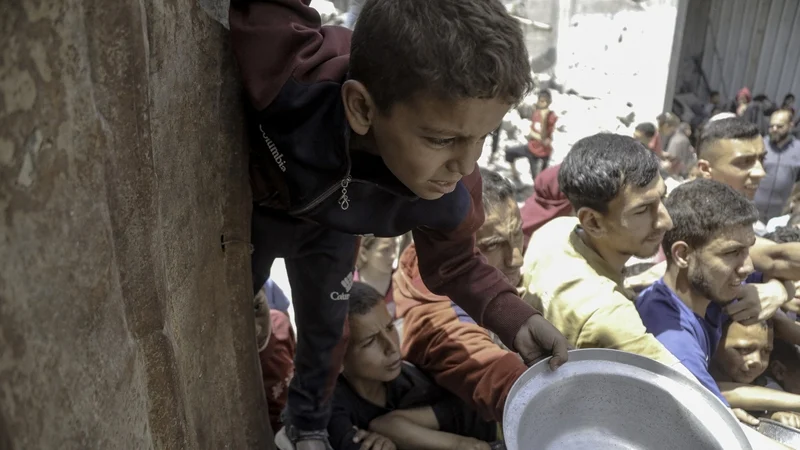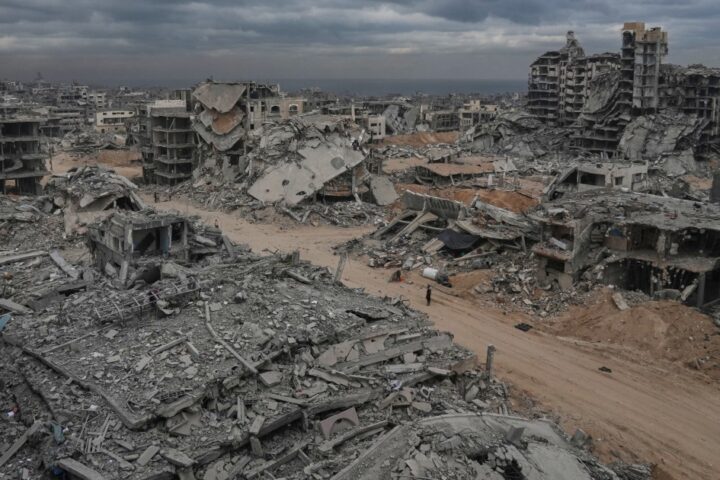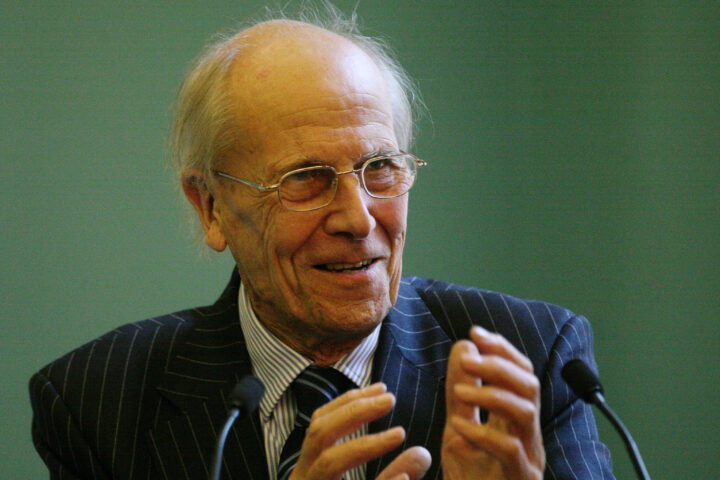The UN’s humanitarian chief Tom Fletcher has said 14,000 babies could die in Gaza in the next 48 hours if more aid does not reach them.
The Under-Secretary-General for Humanitarian Affairs and Emergency Relief Coordinator said the aid lorries, which contain baby food and nutrition, are technically in Gaza but have not reached civilians.
Mr Fletcher’s comments come as the United Nations received permission from Israel for about 100 more emergency aid trucks to enter Gaza, though the first supplies to have entered in weeks remained under Israeli control, a spokesperson said.
International humanitarian experts have warned of looming famine in the Palestinian territory of 2.3 million people.
“We have requested and received approval for more trucks to enter today, many more than were approved yesterday,” Jens Laerke, spokesperson for the UN humanitarian office (OCHA) told a press briefing in Geneva.
Asked to specify how many, he said: “Around 100.”
After weeks of blockade, Israel cleared nine trucks of goods yesterday to enter Gaza through the Kerem Shalom crossing.
However, Mr Laerke said just five of those had so far entered Gaza and were still currently “under Israeli control” and subject to the last stage of checks.

“The next step is to collect them, and then they will be distributed through the existing system,” said Mr Laerke, adding that those trucks contained baby food and nutritional products for children.
“We know for a fact that there are babies in urgent life-saving need of these supplements. And if they do not get those, they will be in mortal danger,” he said in response to a question about whether babies’ lives were at risk.
Mr Fletcher previously called the aid deliveries approved so far “a drop in the ocean”.
Israel says it plans to intensify military operations against Hamas and to control the whole of Gaza, which has been devastated by an Israeli air and ground war since Hamas’ cross-border attack on Israeli communities on 7 October 2023.
Israel has said its blockade is aimed in part at preventing Palestinian militants from diverting and seizing aid supplies. Hamas has denied doing so.
Malnutrition rates in the densely populated territory have risen during the Israeli blockade and could rise exponentially if food shortages continue, a health official at the UN Palestinian refugee agency UNRWA said at the same briefing.
“I have data until end of April and it shows malnutrition on the rise,” said Akihiro Seita, UNRWA Director of Health.
“And then the worry is that if the current food shortage continues, it will exponentially increase, and then get beyond our control.”
Netanyahu announced resumption of aid amid pressure from US, Europe
Israeli Prime Minister Benjamin Netanyahu announced the temporary resumption of “basic” humanitarian aid yesterday, amid rising pressure from the US and European nations to end the blockade causing famine conditions in Gaza.
Defending the decision, which was opposed by several Israeli cabinet members, Israel’s foreign minister Gideon Sa’ar said Israel “must be sure that we are conducting this war in a way that can be supported by our friends”.
Asked if such a minimal aid operation could be seen as UN participation in little more than a propaganda exercise for Israel, a spokesperson for the UN Secretary General said there was “physical and reputational risk” for the UN to be involved, but that it did not have “the luxury to say no”.
“We will participate in aid that we’re able to distribute under our own principles,” spokesperson Stéphane Dujarric said, adding “we have a responsibility to the people of Gaza”.

Taoiseach Micheál Martin said it was unbelievable that only five trucks carrying aid were allowed to enter Gaza yesterday when 500 or more are needed.
“The bypassing of the United Nations is also reprehensible,” Mr Martin said on his way into Cabinet this morning.
“The United Nations have agencies who understand the situation in great detail on the ground, who are in a position to get the aid there, quickly to people and to help people, and quickly to help the children and the UN agencies should have… control of the distribution of aid into Gaza,” Mr Martin said.
Israeli officials have long claimed that UN-distributed humanitarian aid was being diverted to Hamas militants in Gaza.
Last week, the United States confirmed plans to set up a new aid distribution system run by private companies and protected by Israeli military forces. The move was rejected by the UN.
Mr Fletcher called the plan “a fig leaf for further violence and displacement of Palestinians”.
“It is a cynical sideshow, a deliberate distraction,” he told a meeting of the UN Security Council last Tuesday.
In his remarks, Mr Fletcher asked council members what they would tell future generations they did “to stop the 21st century atrocity to which we bear daily witness in Gaza”.
He was the first UN official to use the term “genocide” in connection with the war in Gaza.
“Will you act – decisively – to prevent genocide and to ensure respect for international humanitarian law? Or will you say instead: we did all we could?” he said.
The Israeli mission to the UN issued a furious response.
“You had the audacity in your capacity as a senior UN official to stand before the Security Council and invoke the charge of genocide without evidence, mandate or restraint,” Israel’s ambassador to the UN, Danny Danon, wrote in a letter to Mr Fletcher’s office.
Mr Danon also accused the UN aid chief of “abandoning the principles of neutrality”.

Ireland joins countries urging Israel to allow full resumption of aid
Ireland was among 22 donor countries who issued a joint statement urging Israel to “allow a full resumption of aid into Gaza immediately” after the partial lifting of its blockade on the territory.
Tánaiste and Minister for Foreign Affairs Simon Harris joined the foreign ministers of 21 other donor nations in saying that “whilst we acknowledge indications of a limited restart of aid”, the population of the Gaza “faces starvation” and “must receive the aid they desperately need”.
“Prior to the aid block, the UN and humanitarian NGOs delivered aid into Gaza, working with great courage, at the risk of their lives and in the face of major access challenges imposed by Israel.
“These organisations subscribe to upholding humanitarian principles, operating independently, with neutrality, impartiality and humanity.
“They have the logistical capacity, expertise and operational coverage to deliver assistance across Gaza to those who need it most,” they said.
The statement was also backed by the EU’s foreign policy chief Kaja Kallas, the bloc’s commissioner in charge of crisis management, Hadja Lahbib, as well as Dubravka Suica, the commissioner for the Mediterranean.
Meanwhile, Minister of State for International Development Neale Richmond called on Ms Kallas to reopen the issue of potential trade sanctions against Israel over its conduct of the Gaza war.
The denial of humanitarian aid, and the death toll of over 53,000 people, has seen a shift in sentiment at EU level, with traditionally staunch supporters of Israel expressing more unease at the level of suffering in Gaza.
The Dutch government, a long supporter of Israel, has effectively revived the Irish and Spanish initiative – launched last year by then taoiseach Leo Varadkar and Prime Minister Pedro Sanchez – to hold Israel to account under Article 2 of the EU-Israel Association Agreement, which binds both sides to human rights and international law obligations.
Dutch foreign minister Casper Veldkamp wrote to Ms Kallas two weeks ago calling for the EU to assess whether or not Israel is in breach of Article 2.
Speaking in Brussels, Mr Richmond said: “It’s quite clear that momentum is growing. If we look at over a year ago when the Irish and Spanish taoiseach and prime minister put down requests to open up Article 2 it was just two countries. Now we have up to ten countries.
“The point we’ll be making quite clearly to the high representative [for EU foreign policy] is that you don’t need a majority. You don’t need a unanimous decision [to review Israel’s compliance with Article 2].
“It’s now the time to make sure that not only can we hold Israel to account, but actually that we show that the European Union believes in the rule of law and it believes in the protection of our values,” he added.















